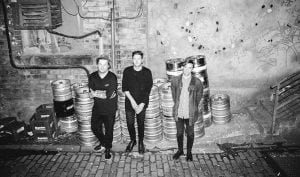Although the headlines and YouTube videos will tell you we are currently in the middle of a 1980’s reemergence, thanks to a number of bands throughout the years, it’s safe to say that 80’s music never really died. Drawing upon the reverberating and washed out textures of the post-punk world, bands within the “post-punk continuum” movement have kept the spirit of the 80’s alive and well. Situated firmly amongst this group of musicians, we find the Portlandian post-punk enthusiasts, Soft Kill.
Having officially entered the scene in San Diego during 2010, they reentered the music scene in 2015, born anew in the streets of Portland, Oregon. Lead by singer/guitarist Tobias V.H., the band resurfaced with Maximillion Avila behind the kit (of Holy Molar, Antioch Arrow and Chromatics fame), and Owen Glendower on synth and bass. The newly assembled outfit went on to record last Choke, an album praised for its masterfully realized vision and production. Drenched in moody, guitar-driven atmospherics and airy, melancholic vocals, this lush soundscape is often punctuated and undercut by the raw power of Avila’s drumming, and driven by the energy and edge of a punk band experimenting with tonality.
While it’s easy to apply the generalized “post-punk” label to the band’s sound, the band really shows little concern for belonging within a genre. Their music is played with the kind of sincerity that gives way to a palpable originality. While they may be retooling a soundscape firmly explored by those who came before, with Choke they have taken the genre by the unique grip of their own hands. Tobias stopped by for a quick chat about the production of this album, as well as what it takes to bring the album to life in concert.
And be sure to catch them September 10 at the Echoplex Los Angeles!
CONCERT GUIDE LIVE: Considering how much atmosphere your songs have, how do your songs begin? A riff? A certain sound? An idea? What’s the beginning of the process look like?
TOBIAS V.H.: For me, I normally program a drumbeat and start laying down guitars. I would lay down one or two guitar parts and just streamline and work on the interplay of those two. And from there, I would put a bassline over it after the fact, instead of starting the foundation with drums and bass.
CGL: The vocals on Choke are often washed out to the point of inscrutability. In this regard, how do you write your lyrics knowing most words will be lost in the reverb of your production?
TV.H.: That’s been the only one of our three records with that production approach. It was intentional to some degree, inspired somewhat by Cocteau Twins, with the vocals being an instrument more than a tool to get a certain story across. That being said, it’s lyrically one of the deepest things we’ve done, so people should definitely check out the insert and read along.
CGL: There are melancholic, brooding undertones to most of your music. Would you consider yourself a melancholic or brooding person? Or are you simply attracted to that type of sound?
TV.H.: I’ve lived a very dark life and that lead me down a pretty heavy road most people wouldn’t be able to relate to so musically it fits the autobiographical nature of the songs. There is a lot of death in the lyrics, lot of obituaries for allies who didn’t make it out of the life we collectively chose: drugs, prison, violence and chaos. That being said, I am a fairly upbeat and goofy person, genuinely. The trend of being a depressed, negative asshole doesn’t bode well with me at all.
CGL: I see the word post-punk often ascribed to your band. What does post-punk mean to you and how do you fit into that definition? If not with “post-punk,” or in addition to, how would you describe your music?
TV.H.: Post Punk by definition is all the music that came in the wake of the original wave of ’77 punk. The Cure, Joy Division, Magazine and Bauhaus are all starting points, paving the way for The Chameleons, The Sound, Lowlife and other bands who were a huge influence on us. Because those are our favorite artists it’s easy to just call us that. I just consider us a punk band.
CGL: Given the importance of atmosphere in your songs how do you approach performing live? Do you work closely with the sound engineers? How do you think your music translates to the stage from the studio?
TV.H.: We’ve been lucky to figure out which venues really get what we’re doing, with sound systems and engineers we can rely on. We usually fill the room with a dense wall of smoke, turn up loud and rely on our own lights to convey the overall vibe and backdrop for our songs. I definitely believe we’re a band to see live if you like the records.
